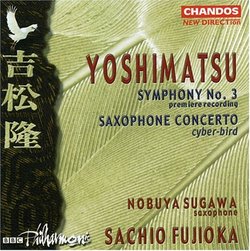Nobuya Sugawa should be a household name among saxophonists
O. Angel Negrin | Austintown, OH, USA | 04/22/2001
(5 out of 5 stars)
"Yoshimatsu's Fuzzy Bird Sonata and his Cyber Bird Saxophone Concerto, both written for Japanese saxophone virtuoso Nobuya Sugawa, challenge the saxophonist on a vast variety of levels from technical agility to contemporary effects. The saxophone concerto, in the hands of Sugawa, is a non-stop saga which grabs you by the ears and doesn't let you go until the final release. Sugawa's effortless control of every aspect of the saxophone allows him to paint from an infinite amount of colors and textures through passages slow, quick, piano, forte, or any combination or permutation of the four. Highly recommended also are his 3 saxophone literature albums: "Cafe 1930" (contains works by Piazzolla and the Villa-Lobos "Fantasia"), "Fuzzy Bird" (major saxophone sonatas), and "Cyber Bird" (major saxophone concerti). One can exhaust an entire dictionary of superlatives when describing Sugawa's playing, but words are just words. Get some of his albums and get him in your ear."
Excellent performances of music by Yoshimatsu
M. Sewell | Hancock, MI United States | 12/24/2000
(5 out of 5 stars)
"Nobuya Sugawa is an amazing saxophonist and really plays the Cyberbird Concerto well. His artistry is complete in both technique and interpretation, and this piece is certainly a challenge for any saxophonist. The Symphony #3 is darker in mood compared to the Concerto, but is still moving and played very well by this BBC Orchestra. Yoshimatsu's style of composition is very accessible to a wide range of listeners without a diminishment in quality. He is very inventive in how he uses sound, and I highly recommend any of his music."
An eclectic ear creates electrifying music
Prof. JiBbLe, Dr. of Thinkology | HUGHESTON, WV USA | 05/03/2005
(5 out of 5 stars)
"Yoshimatsu has never hidden his admiration for jazz and rock as well as the great classical music of the past and present; he alloys all these elements into a style that is clear, colourful and completely his own. Strong melody and vibrant rhythm is at the core of his music, giving it solid form and forward propulsion even when it veers briefly into the "avant-garde" (the whispering sounds that suffuse the turbulent opening of the 3rd Symphony, the moments of free jazz improvisation in the Concerto). This composer desires, first and foremost, for the listener to understand and be moved by his work, and he succeeds admirably in his goal."


 Track Listings (7) - Disc #1
Track Listings (7) - Disc #1